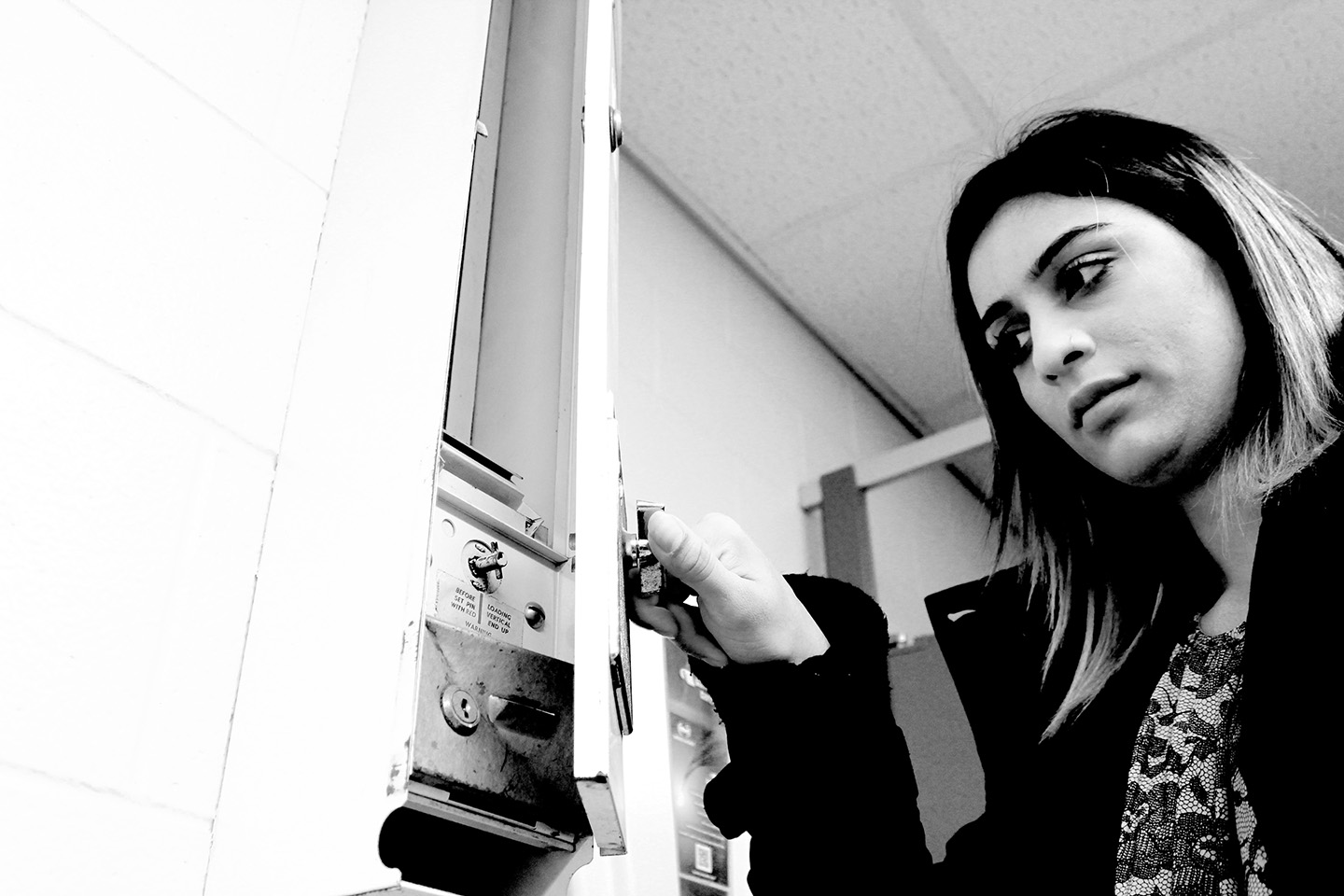by Harleen Kaur Dhillon
The Equity Office hosted a meeting with Plant Operations, Food Services, and the Glow Centre for sexual and Gender Diversity in early October to discuss the best method for making menstrual products available to the campus community, but nothing has been done yet.
“We are exploring options for providing free products,” Gina Hickman, Director of the Equity Office, said. “One of the first steps was looking into whether we could use the existing dispensers machines (without cash). We recently received some information about the feasibility of that proposal and the associated costs. We are also looking into the cost of acquiring and installing new free dispensers,” she said.
Accessibility of products for people who menstruate, but do not identify as women was also discussed. One of the ideas suggested was the use of existing dispensers in the women’s washrooms and additional dispensers in gender neutral washrooms to dispense free products.
“[The stakeholders] all support the provision of free menstrual products and making these products available in a safe, hygienic, and respectful way,” Hickman said.
“They also emphasized the importance of providing products in locations that can be accessed by people who may not identify as women and thus would not be in a women’s washroom,” she said.
In the interim period, the responsibility of providing menstrual products falls on the Women’s Centre.
Faculties are also able to provide free menstrual products at their own cost.
“We are a Feds, student-run organization — we do have a budget and if that’s not put into consideration then we might not be able to provide those products anymore,” Katerina Pagura, Social Director of the WC said.
“That’s a big part of our mission — to provide these kinds of resources on campus. However, we are looking forward to receiving further support from external partners within the university so we are better equipped to offer more than just menstrual products,” Vivien Pham and Akshaya Raja, Service Coordinators of the WC said in a joint statement.
Initially, Plant Operations had planned to work with Food Services to provide menstrual products for a cost through vending machines. Students have previously expressed skepticism.
Pagura said that this put people who menstruate — especially those who do not present female — in a difficult spot.
“A lot of people are still embarrassed because of the stigma [to menstruate], and that’s a big problem in our society as a whole, but if you already don’t feel comfortable that you’re menstruating, and then having to go somewhere very public [for menstrual products] — that doesn’t help anyone,” she said.
Hickman also said that the plan with vending machines is unclear, and they would not be the main method of dispensing menstrual products.
The Equity Office maintains that they invited the Women’s Centre to the meeting, but the WC denies receiving an invitation. Despite being an executive member, Pagura was unaware of the meeting taking place. She identified the lack of communication among groups as a major barrier to student participation.
“I think one of the biggest problems with our schools is communication. Just because we have all these events and all these GMs […] stuff that can really make an impact and a change, but the way they advertise it, I don’t think [it] is well done,” Pagura said. “We are still in that mentality where groups get left out and don’t get considered. Unless you’re in this in-group where you work for Feds, you know exactly what’s going on, or you’re a prof, […] you don’t know, which is unfortunate because how are we supposed to know? How are students supposed to be able to make a change where we are living, where our money is going, and where we spend at least 80 per cent of our time now?”
Hickman said that the meeting was an attempt to consult with all of the stakeholders properly.
“Since the machines were removed, it has become clear that many campus members believed there was not adequate consultation involving this decision and that removal of the machines represents a significant inconvenience and a gap in service for people on campus,” she said.
Pagura also said that, since HeForShe is a major project for the university, UW should be working towards gender equality on all fronts, and that includes access to free menstrual products. She also said that there is still a lot of stigma around periods, and “menstruation days” and “shark week” are not effective in empowering people who menstruate.
“[It’s] doing nothing for the women on campus. I understand [the President wants] to do all of these impactful things for women, and that’s great,” Pagura said. “I think it just needs to be talked about, it’s too quiet, it’s too swept under the rug. However, when HeForShe hosts one Menstruation Day a term, and it’s all focused around women menstruating where it’s still called “shark week” — that doesn’t make an impact because that still puts the negative connotation with menstruating. So men, who are predominant in our school right now because of the Engineering and the Math faculties, have this negative stigma towards it,” she said.
Pagura also believes that President Feridun Hamdullahpur needs to be more active in this conversation, especially as he is championing the HeForShe movement.
“There’s a lot of things you could do for HeForShe that other schools are doing because it’s not just menstruation, […] I think he needs to be there sitting on these meetings because it’s a major issue, people don’t understand it, and people don’t understand that it’s not a choice.” she said.
Plant Operations, Custodial Services, and President Hamdullahpur were contacted, but did not comment.






























